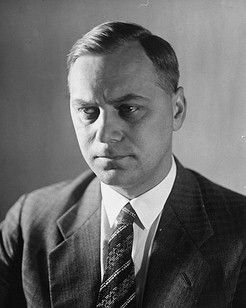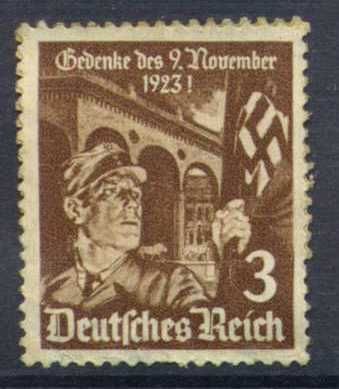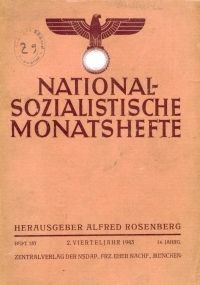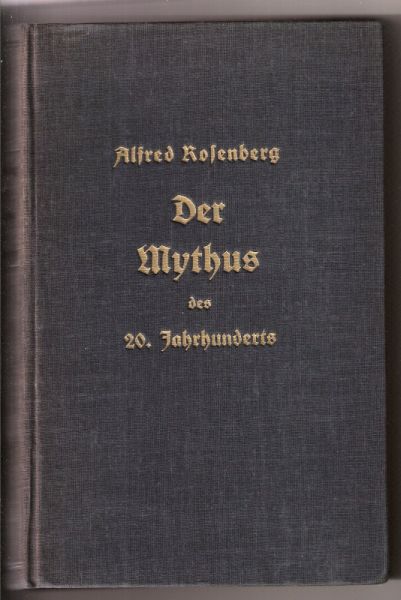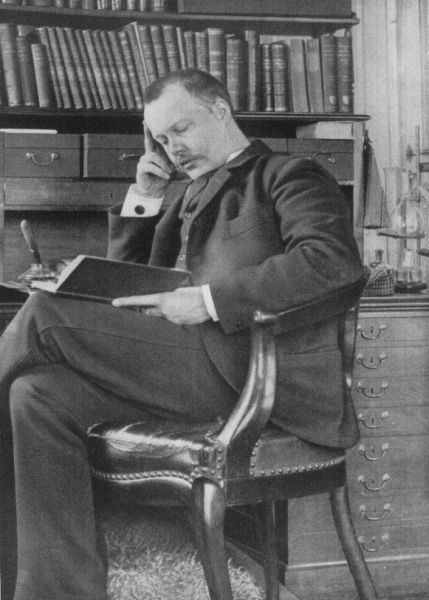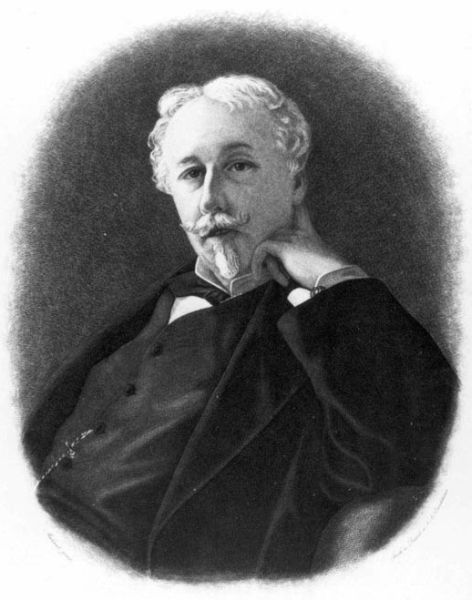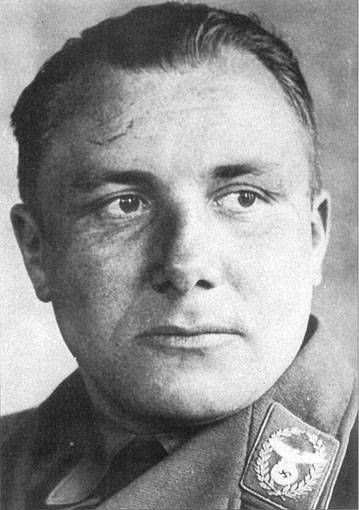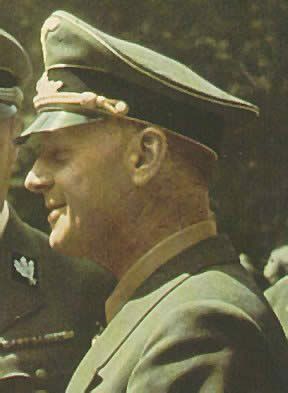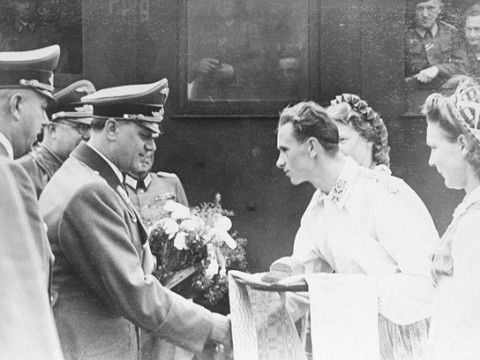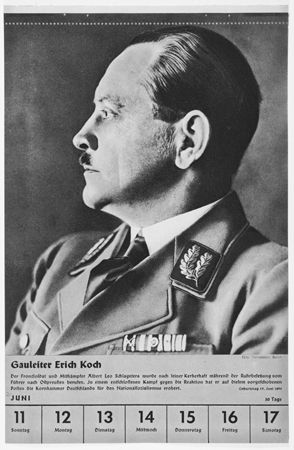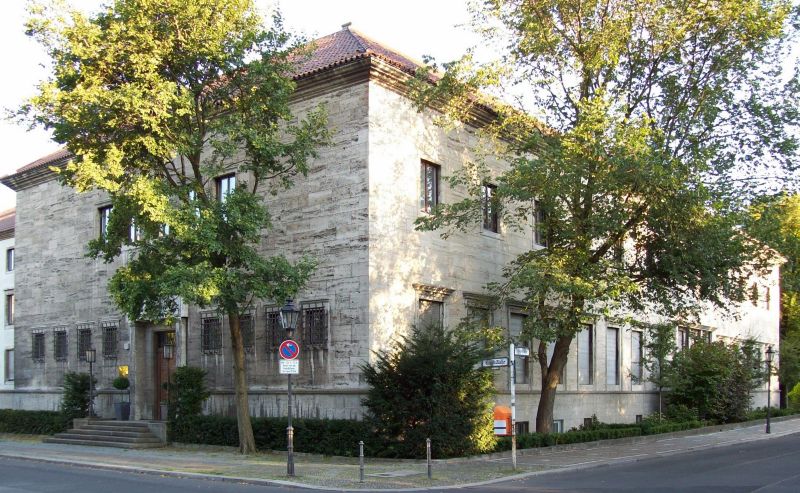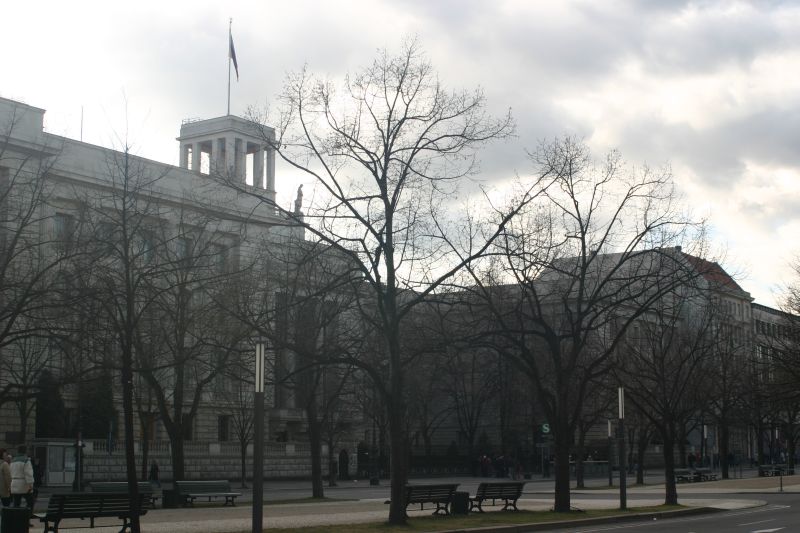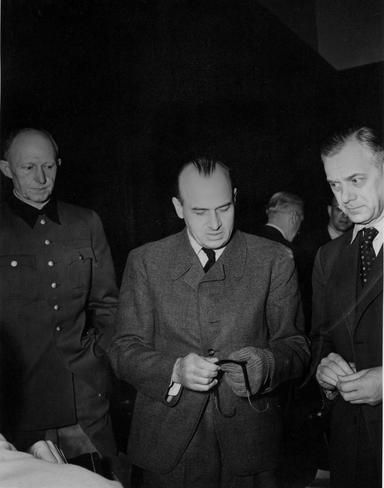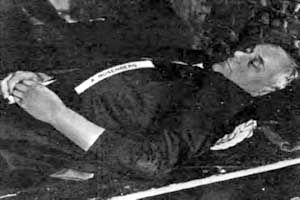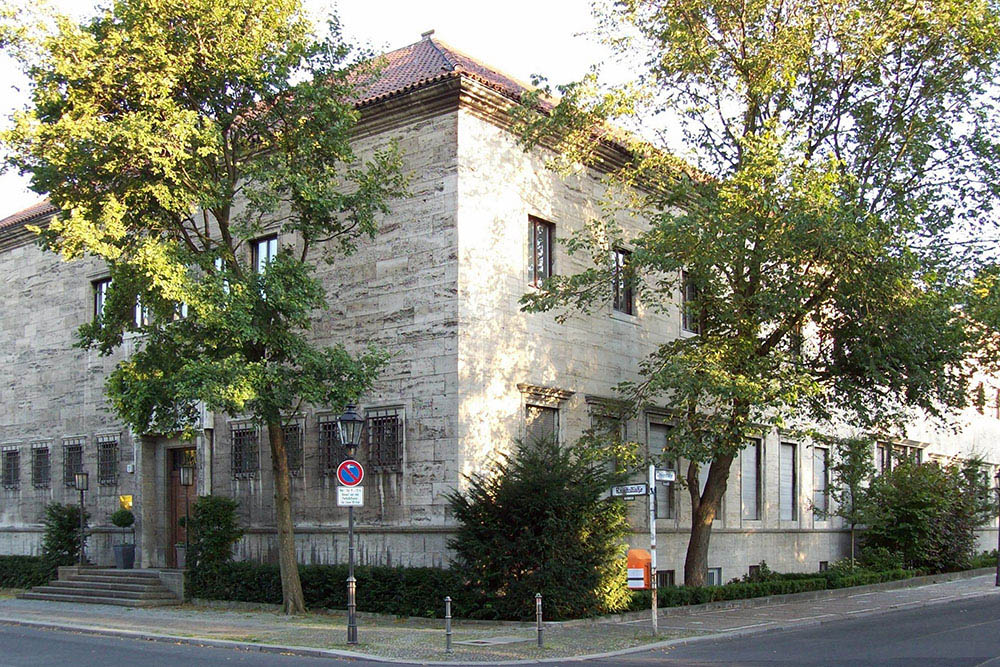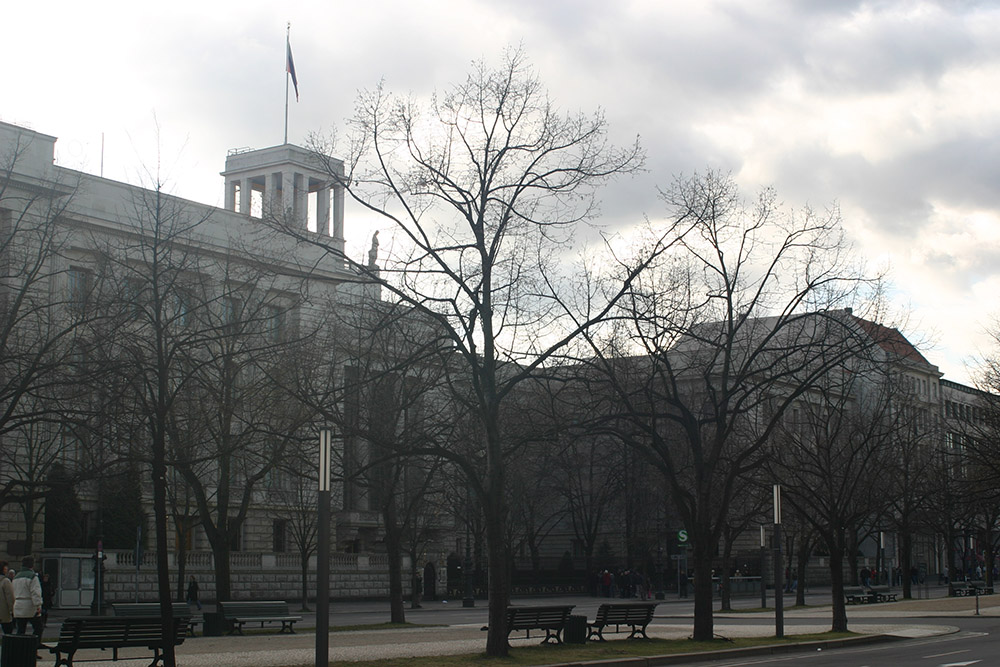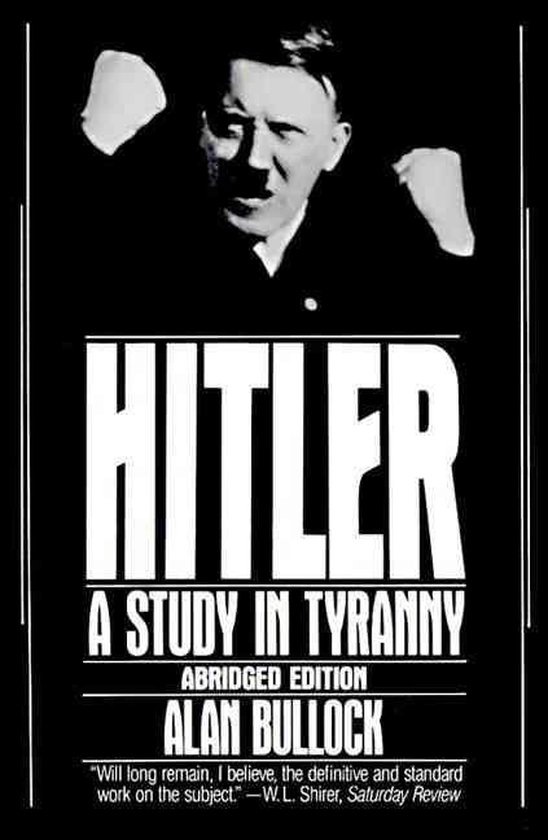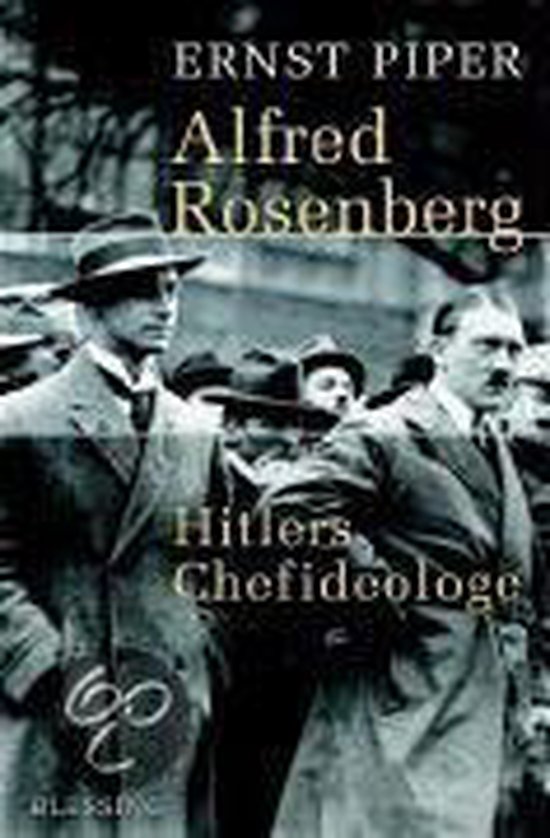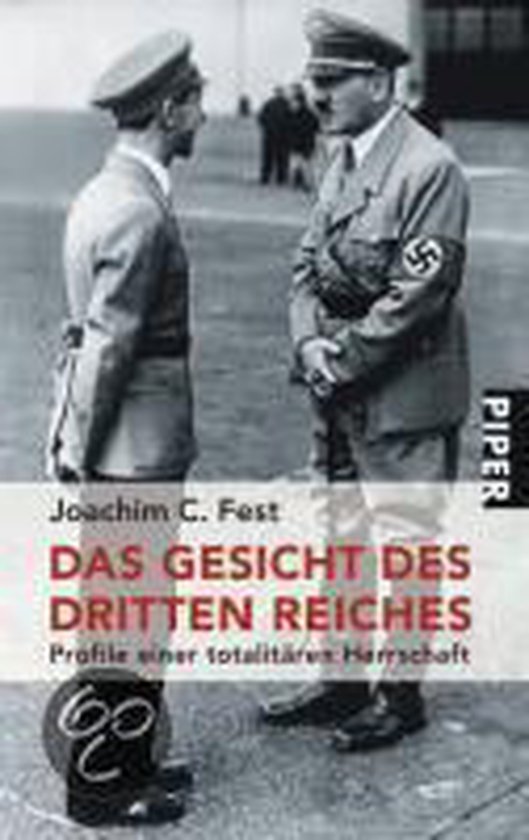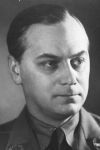Introduction
Alfred Rosenberg’s career envelops nearly the entire National socialism in Germany. He was the party ideologist who later held a few more or less important posts in the Nazi government. Rosenberg is considered the person who has developed the essentials points of the Nazi ideology and put them to paper.
Rosenberg built an ideological foundation under the abolition of the Treaty of Versailles, the National socialist racial theory, the persecution of the Jews, the notion of Lebensraum (space to live) and the ban on degenerate art. His rejection of Christianity in favour of a "Nordic religion of the blood" could not count on the cordial agreement of Hitler but in real life, Rosenberg’s ideas of a new religion had an influence on Nazi policy which must not be underestimated.
Rosenberg’s interests lay mainly in the sphere of religion and philosophy. He lacked the charisma and political cunning of other Nazi leaders. In the Third Reich, he therefore occupied a more or less isolated position among the high ranking N.S.D.A.P. officials.
Definitielijst
- ideology
- A collection of principles and ideas of a certain system.
- Jews
- Middle Eastern people with own religion that lived in Palestine. They distinguished themselves by their strong monotheism and the strict observance of the Law and tradition. During World War 2 the Jewish people were ruthlessly persecuted and annihilated by the German Nazis. . An estimated 6,000,000 Jews were exterminated.
- Lebensraum
- “Living space”. Nazi term indicating the need for the overpopulated German lands to expand.
- National socialism
- A political ideology drawn up by Hitler based on the superiority of the German race, the leader principle and fierce nationalism that was fed by the hard Peace of Versailles. National socialism was anti-democratic and racist. The doctrine was elaborated in Mein Kampf and organised in the NSDAP. From 1933 to 1945 National socialism was the basis of totalitarian Germany.
- Nazi
- Abbreviation of a national socialist.
- persecution of the Jews
- "Judenverfolgung", action imposed by the Nazis to make life hard for the Jews, to actively persecute them and even annihilate them.
- socialism
- Political ideology aiming at slight or no class differences. Means of production are owned by the state. Evolved as a response to capitalism. Karl Marx tried to substantiate socialism scientific.
Images
Education and early political career
Alfred Ernst Rosenberg was born January 12th, 1893, in Reval, the present-day Tallinin, the Estonian capital, at the time part of Czarist Russia. His parents were Baltic Germans. His father was a wealthy salesman from a Latvian family of Huguenots, his mother was of Estonian lineage and originated from Reval.
Rosenberg studied architecture at the Polytechnical Institute in Riga where he was a member of a pro-German group of students. He continued his studies at Moscow University, graduating in 1917. In Moscow, he was a witness to the communist revolution. He supported the counter revolutionaries and became a rabid anti-communist. After the establishment of the new governemnt in Moscow, he immediately returned to Reval. From Estonia, independent meanwhile, Rosenberg left for Germany via Paris in Novembver 1918. Like so many other emigrants from Russia, he settled down in Munich. His stay in Moscow at the time of the revolution would have a profound impact on the development of his ideological ideas with his loathing of Russia in general and of communism in particular being a few central subjects.
In January 1919, Rosenberg became one of the first members of the Deutsche Arbeiterpartei (D.A.P., German Workers Party), an extreme rightwing splinterparty, based in Munich which focused mainly on rebuilding Germany’s military strength after the lost First World War. Adolf Hitler (Bio Hitler), at the time a completely unknown local politician would join the D.A.P. in October 1919. Like the other later well known Nazis like Rudolf Hess (Bio Hess) and Hans Frank (Bio Frank), Rosenberg was a member of the Thule-Gesellschaft, an anti-Semitic, rightwing extremist organisation that actively resisted the communist city council of Munich. On February 24th, 1920, partly with members of the D.A.P. and under the direction of Hitler, the Nationalsozialistische Deutsche Arbeiterpartie (N.S.D.A.P. or National socialist German Workers Party) was established. Not surprisingly, Rosenberg also joined the new party. He received member number 625. In 1921 Rosenberg became editor and in 1923 Schriftleiter (editor in chief) of the partyorgan Völkische Beobachter (People’s Observer).
On November 9th, 1923, Rosenberg participated in the failed Bierhalleputsch. This made him one of the Alte Kämpfer (Old warriors) of the movement. Later he would be awarded the Blutorden for this, a decoration especially instituted for these veteran warriors. The putsch was an attempt by Hitler to violently overthrow the Bavarian govenrment. A number of Bavarian officials were having a meeeting in the Bürgerbräukeller in Munich and Hitler barged in with his SA raiders. The officials were arrested and unrest erupted in the streets of Munich. In the Residenzstrasse, this led to a firefight where Hitler and his followers were arrested. Hitler would spend a year in Landsberg prison. The N.S.D.A.P. was banned.
During his imprisonment, Hitler named Rosenberg the leader of the movement during his forced absence. Rosenberg established the Grossdeutsche Volksgemeinschaft (Greater German People’s Association), a replacement of the N.S.D.A.P., which would exist until the re-establishment of the N.S.D.A.P. in 1925. Later on Hitler remarked in private that his choice of Rosenberg had been a tactical one. He considered Rosenberg a man of a weak personality lacking initiative. The last thing Hitler wanted was a temporary leader who was popular and striving for power; after all, a person like that was likely not to give up his position easily after Hitler’s release. Whatever it was, Rosenberg frequently visited Hitler in prison and later claimed he had helped him to write Mein Kampf. How much of the contents of the book can be attributed to Rosenberg remains unclear but his ideas have shaped the politician Hitler in large measure.
Little is known about Alfred Rosenberg’s private life. In 1915, he married Hilda Leesmann, an ethic Estonian. He divorced her in 1923 and in 1925 he married Hedwig Kramer. This marriage would last until his death. They had two children: a son who died at an early age and in 1930 a daughter Irene. She has always refused all contact with those wanting to speak to her about her father.
Definitielijst
- Alte Kämpfer
- “Old fighters”. German soldiers with experience on the war front. Sometimes used within the NSDAP for those who had been fighting for the same cause before. Soldiers with battle experience were considered heroes by recruits and the home front, especially towards the end of the war.
- Blutorden
- “Blood Order”. German decoration awarded in 1934 to those members of the NSDAP who had participated in the Bierhalleputsch of 1923.
- communism
- Political ideology originating from the work of Karl Marx “Das Kapital” written in 1848 as a reaction to the so-called class struggle between the proletariat (labourers) and the bourgeoisie. According to Marx the proletariat would take over power from the well-to-do classes though a revolution. The communist movement aspires an ideal situation where the means of production and the means of consumption are common property of all citizens. This should end poverty and inequality (communis = common).
- First World War
- Took place from 1914 till 1918 and is also named The Great War. The conflict started because of increased nationalism, militarism and neo-colonialism in Europe. Two alliances battled one another during the 4-year war, which after a dynamic start, resulted into static trench warfare. The belligerents were the Triple Alliance (consisting of Great-Britain, France, and Russia; later enlarged by Italy and the USA, amongst others) on the one hand and the Central Powers (consisting of Germany, Austria-Hungary, Bulgaria and the Ottoman empire) on the other hand. The war was characterized by the huge number of casualties and the use of many new weapons (flamethrowers, aircraft, poison gas, tanks). The war ended in 1918 when Germany and its allies surrendered unconditionally.
- Mein Kampf
- “My Struggle”. Book written by Adolf Hitler, outlining the principles of National Socialism.
- putsch
- Coup, often involving the use of violence.
- revolution
- Usually sudden and violent reversal of existing (political) the political set-up and situations.
Images
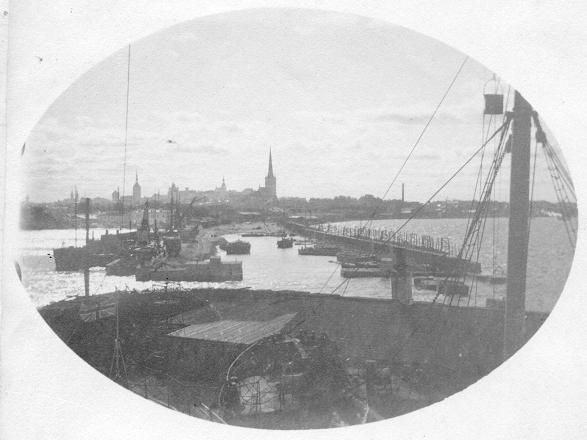 Reval at the time of Rosenberg’s childhood Source: Naval-History.net.
Reval at the time of Rosenberg’s childhood Source: Naval-History.net. The Blood Order Source: tracesofwar.com.
The Blood Order Source: tracesofwar.com.The Nazi ideologist
Rosenberg has exerted a profound infuence on the shaping of Hitler’s view on the world in the early 20s. Foreign policy, Bolshevism and the alleged Jewish conspiracy to achieve world domination were the focal points of Rosenberg’s thinking. The term Jewish Bolsjevism, frequently used by the Nazis, came directly from Rosenberg.
Like many ideologists, Rosenberg was convinced that a succesful policy was unthinkable in practice without a comprehensive theoretical base. He let no chance slip by to entrust his ideas to paper. In the end he would have published more books than all high ranking Nazis put together. As early as 1919, he published two anti-Semitic books; "Die Spur der Juden im Wandel der Zeiten" (The track of the Jews in the course of time) and "Unmoral im Talmud" (Indecency in the Talmud). Moreover, in 1921 he targeted the Freemasons in ''Die Verbrechen der Freimaurer" (The crimes of the Freemasons) in which he exposed his ideas about a global conspiracy by Jews and Freemasons.
Apart from these theoretical essays, the transformation of his ideas into practical policy had Rosenberg’s attention. In these early years, he wrote extensively about almost every aspect of the Nationalsocialist program. His first publication in this connection was "Wesen, Grundsätze und Ziele der N.S.D.A.P." (Nature, basic principles and goals of the N.S.D.A.P.), published in 1922.
Later, Rosenberg said about this book: "In this period (the early years of the N.S.D.A.P.) I wrote a short essay that despite its limited length is important in the history of the party. It was always asked what program points the party had and how they should be explained. That is the reason why I wrote this principal programme including the goals of the N.S.D.A.P." This essay connected the movement in Munich for the first time to the local branches that were set up all over Germany.
In the 20s, Rosenberg remained the most prominent ideological and cultural helmsman of National socialism for the time being. Therefore, in 1927, Hitler ordered him to establish a National socialist cultural organisation which had as its main goal to lend the image of the N.S.D.A.P. a more civilised nature among certain layers of the German population. Especially the intellectual middle class felt less inclined to the radical and violent nature of the N.S.D.A.P. at the time.
On January 4th, 1928, Rosenberg was one of the most prominent signatories of the founding charter of the new organisation that initially went by the bombastic name Nationalsozialistische Gesellschaft für Deutsche Kultur (Nationalsocialist organisation for German culture). In May 1928, its principles were published. The aim was to tie energetic and selfless German men and women to the organisation in the struggle against the degeneration and degradation of life in order to call upon papers, magazines and hitherto suppressed scientists and artisans to organise exhibitions and exert influence on the programming of theatres. Eight out of the 18 members of the committee of recommendation were professors, the others were publishers, managers of theatres, writers and clergymen.
From October 1928 onwards, the official name of the organisation was Kampfbund für Deutsche Kultur (Taskforce for German Culture). Rosenberg failed however to give the Bund the status of an official branch of the N.S.D.A.P. as culture was not high on the list of priorities of the power hungry Nazis. In consolation, Hitler was prominently present at the first public gathering of the Kampfbund at Munich University on February 23rd, 1929. Between April and October 1929, the number of members, who were organised in 450 local branches, increased from 300 to about 38.000. All over the country lectures were given in which everyone and everything not corresponding to the National socialistic view on the world was being attacked.
Between 1929 and 1931, the Kampfbund published a magazine "Mitteilungen des Kampbundes für Deutsche Kultur" (Notices by the Taskforce for German culture). Authors like Thomas Mann, Kurt Tucholsky, Bertold Brecht and visual artisans like Paul Klee and Wassily Kandisky were vehemently attacked and called enemies of the people who were not worthy to be German. Not even the youth was forgotten. On Whitsunday 1930, a large youth meeting was held by the Kampfbund in Weimar and Whitsunday in 1931 saw a similar event in Potsdam. Central themes were the boosting of German morale and a call to resist against hostile influences in the sphere of theatre, literature, visual arts and degenerated architecture.
In these years, Rosenberg could also exert his influence in practical national politics as he became a member of the Reichstag in 1930 for the N.S.D.A.P. constituency of Hessen-Darmstadt. Apart from that, Rosenberg continued publishing. In 1932, "Das Wesensgefüge des Nationalsozialismus" (the principal structure of National socialism) appeared, in 1934 "Blut und Ehre" (Blood and honour) was published. He also was the publisher of the official theoretical magazine of the N.S.D.A.P., "Die Nationalsozialistiche Monatshefte" (the NS monthly papers) a monthly subtitled Zentrale politische und kulturelle Zeitschrift der N.S.D.A.P. (Central political and cultural magazine of the N.S.D.A.P.). However, the book that would seal Rosenberg’s reputation among friend and foe forever was "Der Mythos des 20sten Jahrhunderts" (The Myth of the 20th century).
Definitielijst
- Jews
- Middle Eastern people with own religion that lived in Palestine. They distinguished themselves by their strong monotheism and the strict observance of the Law and tradition. During World War 2 the Jewish people were ruthlessly persecuted and annihilated by the German Nazis. . An estimated 6,000,000 Jews were exterminated.
- National socialism
- A political ideology drawn up by Hitler based on the superiority of the German race, the leader principle and fierce nationalism that was fed by the hard Peace of Versailles. National socialism was anti-democratic and racist. The doctrine was elaborated in Mein Kampf and organised in the NSDAP. From 1933 to 1945 National socialism was the basis of totalitarian Germany.
- socialism
- Political ideology aiming at slight or no class differences. Means of production are owned by the state. Evolved as a response to capitalism. Karl Marx tried to substantiate socialism scientific.
Images
The myth of the 20th century
"The Myth of the 20th century", subtitled "Eine Wertung der seelisch-geistigen Gestaltenkämpfe unsere Zeit" (An opinion on the mental and rational struggle for personality in our time) was published in 1930. It counts over 700 pages and is considered the most important theoretical work on National socialism second to Hitler’s Mein Kampf. Until 1945, over a million copies had been sold. It also enjoys the questionable honour of having been included in the index of banned books by the Catholic Church. The book pretended to present an all encompassing explanation of world history and to form a philosophic base for the National socialist claim to power. The work was meant as a continuation of "The Foundation of the Nineteenth Century" by British author Houston Stewart Chamberlain. He argued - in short - that western civilisation had been profoundly influenced by Germanic peoples.
The Myth is considered the key book on racial theory of the Nazis and was revered within Nazism. On the other hand however, the influence on Nazism must not be overestimated. Only a few have really read it from cover to cover and many considered and still consider the contents incomprehensible. Hitler once called it a book nobody can understand and on another occasion even rubbish.
In "The Myth", Rosenberg quotes an immense number of cultural historic and philosophical texts from the entire world history and from all cultures. He more or less pushes all this material into the template of National socialistic world view. The entire world history is explained with one principle, that of National socialism. Rosenberg portrays the National socialistic revolution as the final goal of world history.
"The Myth", seen as a whole, is an attempt by Rosenberg to raise his racial ideology to a scientific level by referring to age old philosophic patterns of thinking. In doing so, Rosenberg wanted to secure the Nationalsocialistic claim on new forms of religion and world view. In practice, this was to fail miserably. To the practical politicians of the Nazi regime, the work was far too theoretical and the majority of German intellectuals were not swept away by it. The racial theory Rosenberg exposes in his book may well be an enormous theoretical structure but it is supported in no way whatsoever by any fact or scientifically sound arguments.
Definitielijst
- ideology
- A collection of principles and ideas of a certain system.
- Mein Kampf
- “My Struggle”. Book written by Adolf Hitler, outlining the principles of National Socialism.
- National socialism
- A political ideology drawn up by Hitler based on the superiority of the German race, the leader principle and fierce nationalism that was fed by the hard Peace of Versailles. National socialism was anti-democratic and racist. The doctrine was elaborated in Mein Kampf and organised in the NSDAP. From 1933 to 1945 National socialism was the basis of totalitarian Germany.
- Nazi
- Abbreviation of a national socialist.
- Nazism
- Abbreviation of national socialism.
- revolution
- Usually sudden and violent reversal of existing (political) the political set-up and situations.
- socialism
- Political ideology aiming at slight or no class differences. Means of production are owned by the state. Evolved as a response to capitalism. Karl Marx tried to substantiate socialism scientific.
Images
Rosenberg's theory on races
Rosenberg saw it as his duty to create a hierarchy of races in order to justify Hitler’s politics. He used the works of racist and anti-Semitic authors like Frenchman Joseph-Arthur de Gobineau, British Houston Stewart Chamberlain and American Madison Grant as base. Rosenberg however lacked any anthropological knowledge. Moreover he skipped the scientific sources available to the authors mentioned above. In stead of scientifically founded research he chose his own philosophical ideas as his base.
Rosenberg argued there are two opposing races. On the one hand the Arian race as creator of all values and culture and on the other hand the Jewish race, representatives of cultural corruption and degeneration in all possibled fields. In his vision, the notion of race was the decisive factor in art, culture and the entire course of world history. The Teutons (read: Germans) represented the masterrace of the Arians whose task it was to dominate Europe. He rejected Jewry and Christianity. Their ideals of love thy neighbour and charity should be replaced by a new heathenish Teutonic sense of honour. The Jews had destroyed the pure racist ideal by their humane religion that was destructive to the true Teutonian spirit of blood, honour and courage.
In the Mythos he wrote: "The essence of the present worldrevolution lies in the awakening of the types of races, not only in Europe but across the entire planet. This awakening is the natural reaction aimed at the last chaotic remnants of the liberal, economic imperialism where its subject of exploitation has fallen into the trap of bolsjevistic Marxism out of pure desperation, in order to finish what democracy has started, namely the eradication of the racial and national conscience".
Blacks, Jews and other Semitic races were put at the bottom of the ladder by Rosenberg. At the top stood the white Arian race. Rosenberg considered the Nordic peoples representatives of the masterrace that was superior to all other races, even other Arians. The masterrace consisted of Germans, Scandinavians, Baltics, Dutch (including the Flemish) and the inhabitants of the British Isles. Rosenberg also saw the Berbers in northern Africa as Arians. The Germans were the superior Nordic race, the master race within the master race. In the course of the years, Rosenberg shaped this racial theory differently but his base remained white monocracy, extreme German nationalism and rabid anti-Semitism.
Two quotes by the anti-Semite Rosenberg do not need further comment: "Anti-Semitism is the connecting element in the rebuilding of Germany" and "Germany will consider the Jewish question as solved only after the last Jew has left the Greater German living space. Europe will have solved its Jewish question only after the last Jew has left the continent"
Mention must be made of the fact that Rosenberg was violently opposed to homosexuality. In his pamphlet "Der Sumpf" (the moor) he especially targets lesbians as they stood in the way of procreation of the Nordic race.
Definitielijst
- democracy
- From the Greek: demos (the people) kratein (rules). Democracy is a form of government elected by the majority of the people in which the people can check on the leaders and have the government resign in case a majority of the people no longer agrees with the government.
- imperialism
- The policy of a state to extend its territory by annexations of border areas of other states through colonisation. After World War 2 the term got more of an economic and cultural meaning rather than the actual domination of a territory.
- Jews
- Middle Eastern people with own religion that lived in Palestine. They distinguished themselves by their strong monotheism and the strict observance of the Law and tradition. During World War 2 the Jewish people were ruthlessly persecuted and annihilated by the German Nazis. . An estimated 6,000,000 Jews were exterminated.
- nationalism
- The pursuit of a people to become politically independence or securing such independence.
Images
Rosenberg's theory on religion
To Rosenberg, the age old religious Jewish-Christian doctrines were irrelevant. In his opinion, these should be dumped on the garbage heap of world history. What only counted for him was a belief that would only serve the interests of the Nordic race. With that, the individual would be tied securely to his racial origin. As he said himself: "The general ideas of the catholic and protestant churches (….) do not correspond with our German soul"
Rosenberg advocated a new myth of the blood, based on his assumption of the inborn urge of the Nordic soul to defend its noble character against racial and cultural degeneration. Rosenberg argued that this passion had already been shown in early Indo-European philosophies like the classic European paganism, the Zoroastranism from ancient Persia and Hinduism from the old northern India.
Rosenberg has described the transition to the new religion as follows: "From education by the church to the reform by Germanic values is an enormous step that stretches over various generations. We now find ourselves in the transition from one phase to the next. We (the National socialists) are the conquerors of the old era and the founders of a new era. We are the bearers of a heavy and therefore grand fate. Every revolution had been able to destroy old images. But to found a case on nothing and yet not burn all bridges behind it, that is the noble nature of the National socialist era. The German people is not characterised by original sin but by a hereditary noble nature. The notion of Christian charity has been replaced by the National socialistic Germanic idea of fellowship"
Rosenberg’s ideas about religion were influential in some circles within the N.S.D.A.P. where a convinced anti-Christian mood was prevalent. Martin Bormann (Bio Bormann), Hitler’s private secretary was a prominent representative of this. Bormann had frequent contacts with Rosenberg and they exchanged information on planned actions against churches. They discussed the abolition of religious education, the disowning of ecclesiastical property, banning Christian publications and the closing down of theological faculties.
In 1940, Bormann wrote to Rosenberg: "The churches can not be conquered by means of a compromise between National socialism and the Christian doctrines but only by means of a new ideology that you yourself have announced in your writings".
If theory was to be transformed into practice, then the support of the Führer was essential. Rosenberg’s contemplations however found little sympathy with the Führer in general, at least in public. While Rosenberg considered religion and philosophy as independent goals, to the pragmatic Hitler they were no more than tools to seize absolute power. In the first pIace, it was now imperative not to alienate the churches too much. That official Nazi ideology did not correspond with the doctrines of the church had better be left unspoken. The radical, overt anti-Christian ideas of Rosenberg should for the time being better be left indoors. After the seizure of power in 1933, Hitler assured the Catholic and Protestant churches the Nazis would not replace them with a Germanic paganism at all. He presented himself as the man who would save Christianity from total destruction by the atheistic communists who had after all been pulling the strings in the Soviet Union for years. The churches would become part of a new, positive Christianity united under the banner of National socialism.
That Hitler did not entirely sacrifice the opinion of his early ideologist on the altar of practical power politics becomes clear from the rare occasions when the Führer condemned Christianity as weak and proposed a people’s religion of the blood, based on the fate God had attributed to the German people. He thereby rejected traditional Christianity as a religion based on Jewish culture and advocated an ethnic and cultural pure race whose fate lay in the hands of the German people. After the final victory of the war, the State church would have to transform itself into an organsation that stood for the cult of race, blood and struggle instead of the obsolete Redemption and the Ten Commandments that were antique and Jewish.
Definitielijst
- Führer
- German word for leader. During his reign of power Adolf Hitler was Führer of Nazi Germany.
- ideology
- A collection of principles and ideas of a certain system.
- National socialism
- A political ideology drawn up by Hitler based on the superiority of the German race, the leader principle and fierce nationalism that was fed by the hard Peace of Versailles. National socialism was anti-democratic and racist. The doctrine was elaborated in Mein Kampf and organised in the NSDAP. From 1933 to 1945 National socialism was the basis of totalitarian Germany.
- Nazi
- Abbreviation of a national socialist.
- revolution
- Usually sudden and violent reversal of existing (political) the political set-up and situations.
- socialism
- Political ideology aiming at slight or no class differences. Means of production are owned by the state. Evolved as a response to capitalism. Karl Marx tried to substantiate socialism scientific.
- Soviet Union
- Soviet Russia, alternative name for the USSR.
Images
His position and activities after the seizure of pwer
Viewing Rosenberg’s career in the second half of the 20s and in the 30s, we witness a gradual decrease of influence of the chief ideologist. What started as an ideological movement for Rosenberg evolved in real life to a practical political movement that came to lead a major European power. Practice was now everything and ideology came second. In this, Rosenberg differed from the power politicians who established, consolidated and expanded the Nazi regime all over Europe. Political power was not sufficient for Rosenberg, it was only the beginning. After the seizure of power, the battle for the hearts and minds of the population could begin in earnest. In Rosenberg’s words: "A person fights and dies only for what he believes in". To Rosenberg, the conquest of state power was just the first, but certainly not the most important goal.
That attitude may have been a cause of his defeats in the skirmishes within the N.S.D.A.P. in the years after 1933. The opinion of a purely theoretician were, to put it mildly, not very popular in the circles of Nazis who had some say in matters. They considered themselves men of vigour and violence who would have nothing to do with intellectual mumbo jumbo. After 1933, Rosenberg was hardly taken seriously by the big shots of the party. They considered him an innocent scholastic who could not make any real contribution to day to day politics. Especially in the Minister of Propaganda Josef Goebbels (Bio Goebbels), Rosenberg found a power hungry rival. Goebbels did not only despise Rosenberg as a person, he also was of the opinion that he himself was the one to determine the ideological direction of the party and the regime. It was therefore Goebbels who sidetracked Rosenberg and his Kampfbund by incorporating them into the Reichskulturkammer (State agency for culture) the organisation in which all cultural activities within the Reich were brought together under the umbrella of the Ministry of Propaganda.
In 1933, Rosenberg was appointed Reichsleiter für Weltanschauung und Aussenpolitik (State leader for world view and foreign politics). In this function, he was a member of the party leadership of the N.S.D.A.P. but it did not carry any significant political power. In these years, Rosenberg was not entirely left behind empty handed. After the seizure of power, he became Leiter des Aussenpolitischen Amtes der N.S.D.A.P. (chief of the foreign agency), in short A.P.A. He would remain in this position until 1945 but the influence he could exert from there was still not profound. Actually, the A.P.A. was no more than an office for receiving foreign visitors that still had to share its power with the Ministry of Foreign Affairs. Moreover, Rosenberg did not exactly excel in diplomatic tactical capabilities. For example, in 1934, he vIsited Great Britain In order to convince the British that Germany represented no danger. It should have led to a tightening of the bond between Germany and Great Britain but it turned out a downright disaster. When Rosenberg laid a wreath at the grave of the Unknown Soldier in London, it sported a ribbon with a life size swastika. A British World War One veteran promptly threw it into the Thames.
Not obstructed by any self-knowledge, Rosenberg tried to become Minister of Foreign Affairs but that post went to Joachim von Ribbentrop. In Janauary 1934, Rosenberg was appointed by Hitler Sonderbeauftragter des Führers für die Überwachung der gesamten geistigen und Weltanschaulichen Schulung und Erziehung der N.S.D.A.P. (special envoy of the Führer for the supervision of the combined spiritual schooling and education of the N.S.D.A.P.) He was put in charge of the spiritual and philosophical development of the N.S.D.A.P. and all its branches. Here also he could exert only minimal influence on daily matters. It is characteristic that in 1937, he was stripped of his function as editor in chief of the Völkische Beobachter. He retained the honorary title of publisher.
On January 29th, 1940, Rosenberg was ordered by Hitler to establish the Hohe Schule der N.S.D.A.P. (Academy of the N.S.D.A.P.). It was intended to become the future elite university of Nazism but it was not to come into being until after the war. Rosenberg was ordered to continue the preparatory work by establishing an enormous Fachbibliothek der Judenfrage (Specialist library for the Jewish question). As the first institution of the party university, Rosenberg founded the Institut zur Erforschung der Judenfrage (Research institute for the Jewish question) in Frankfurt on March 26th, 1941. For three days, on occasion of the opening, lectures were held with the central theme the death of the Jewish people. This should be achieved by the Verelendung (making them suffer) of the European Jews by forced labour in enormous camps in Poland.
On April 2nd, 1941 Rosenberg was given the task to further expand the library by Hitler personally. The party organisation that was perfectly suited for this already existed. As early as 1940, the Einstazstab Reichsleiter Rosenberg (ERR, executive staff) was founded as part of the A.P.A. and the executive organ of the Hohe Schule. Since its establishment, the ERR had already, through its 15 so called Aussenstelle (foreign branches, among others one in Amsterdam), confiscated objects of art and culture from Jews, Freemasons and all sorts of opponents to the Third Reich in the occupied territories on a large scale. When the agents of the ERR were raiding in France, they discovered so many cultural objects that they did not limit themselves to Jewish property alone. Between April 1941 and July 1944, 29 convoys went from Paris to Germany to the main warehouse of the ERR in Schwanstein Castle. According to estimates by the ERR itself, 1,418,000 freight cars loaded with books and works of art and another 427,000 ton of cultural heritage were shipped to Germany, including 550,000 books of which some 300,000 ended up in the specialist library in Frankfurt.
Definitielijst
- Führer
- German word for leader. During his reign of power Adolf Hitler was Führer of Nazi Germany.
- ideology
- A collection of principles and ideas of a certain system.
- Jews
- Middle Eastern people with own religion that lived in Palestine. They distinguished themselves by their strong monotheism and the strict observance of the Law and tradition. During World War 2 the Jewish people were ruthlessly persecuted and annihilated by the German Nazis. . An estimated 6,000,000 Jews were exterminated.
- Nazi
- Abbreviation of a national socialist.
- Nazism
- Abbreviation of national socialism.
- Propaganda
- Often misleading information used to gain support among supporters or to gain support. Often used to accomplish ideas and political goals.
- swastika
- Equilateral cross, symbol of Nazi-Germany.
- Weltanschauung
- This expression has often been used to refer to the "wide worldview" or "wide world perception" of a people, family, or person.
Images
Minister of the occupied territories in the East
Following the invasion of the Soviet Union, Rosenberg was appointed Reichsminister für die besetzten Ostgebiete (Stateminister for the Occupied territories in the East) on July 17th, 1941. This would be the higherst political position he would ever hold. Because of his Baltic ancestry, the Führer considered him an Ostexperte (Expert of the East) and therefore perfectly suited to set up an entire new ministry and to establish German rule in the occupied territories in the East. Behind the scenes and prior to Operation Barbarossa, discussions had already been going on about the establishment of such a ministry, in short the Ostministerium. Hitler considered ruling the occupied territories in the East too complex to leave to the army. Actually, from March 1941 onwards, Rosenberg was already active as Ostminister but his official appointment came at a joint luncheon with Hitler at the Wolfsschanze. On this occasion, Rosenberg formulated his political goals that ultimately would become reality: "Annexation of the entire Baltic region, the Crimea, the area of the Volga-Germans and Transcaucasia; a general policy of dominance, slave labour by prisoners of war, administration and exploitation of the areas conquered and Germanisation that have to be carried out with the most severe methods including persecution of the Jewish civilian population and the Ausrottung (Elimination) of everyone standing in our way.".
Rosenberg designed the organisational structure of the occupied areas in the East. New Reichskommissariate (civil administrative units) would have to be created: Ostland (the Baltic states and Byelorussia, ruled from Riga), the Ukraine (and neighbouring areas) ruled from Rovno, Caucasia, Moscow (the city and the other Euro-Russian territories).
After the German invasion of the Soviet Union, these plans were put into practice, after the local fighting had ended, by setting up the Reichskommissariate Ostland and Ukraine led by respectively Hinrich Lohse and Erich Koch. Both were bound by the directives from the Ostministerium and Rosenberg had the exclusive authority to delegate rights and duties to the Statecommissioners.
In the course of the war, the Ostministerium, together with the Reichssicheheitshauptamt (RSHA, `Head office of state security) and the police formed the central authority for the extermination of the Jews in eastern Europe. It is typical in this connection that two high ranking officials of the Ostministerium attended the Wannsee conference: Georg Leibbrant, chief of the political branch of the ministry and Alfred Meyer, Rosenberg’s deputy.
Reichsführer-SS Heinrich Himmler (Bio Himmler) immediately took the initiative in the mass murder of the Jewish population in the occupied eastern territories. In both Reichskommissariate the Einsatzgruppen (special action commandos) moved around with full knowledge of the German civil administration. Most of the Jews were murdered in 1943 and the last ghettos were eliminated in the summer of that year. The contacts between the Ostministerium, the State commissioners and Heinrich Himmler seemed to have worked seamlessly in this connection. Rosenberg had described it as early as 1941: " The goal of the State commissioner is to aim for some kind of German protectorate and subsequently make it into a part of the Greater German state by means of colonisation by German people and the deportation of unwanted elements".
Rosenberg and his Ostministerium frequently urged the chiefs of the SS and the police to avoid public excesses and all too visible mass executions, with little success though. This was not prompted by a less extreme attitude towards the fate of the Jews but by a politically expedient consideration. The goal of the Ostministerium was after all the Germanisation of the occupied areas and it was feared, unrest would erupt among the non-Jewish population if confronted with large scale blood baths.
After 1942, participation in the genocide shifted more and more from the branches of the Ostministerium to the Einsatzstab Reichsleiter Rosenberg and the research institute into the Jewish question mentioned earlier. On the one hand, the Holocaust was carried out in the extermination camps outside the jurisdiction of the Reichskommissariate, on the other hand, the attention of the ministry was increasingly drawn towards a growing number of problems concerning the Germanisation of the east. There was active and passive resistance from the church and from populations, considerd Arian by Rosenberg (Balts, Byelorussians, Caucasians, Russsians), against the forced Germanisation of all aspects of daily life. Moreover, the military situation in the east deteriorated increasingly during the last years of the war, making colonisation by Germans impossible. In the economy of war, there was simply no room left for Rosenberg’s bombastic ideas of a prosperous Arian society in the east.
Definitielijst
- Führer
- German word for leader. During his reign of power Adolf Hitler was Führer of Nazi Germany.
- Holocaust
- Term for the destruction of European Jewry by the Nazis. Holokauston is the Greek term for a completely burnt sacrifice.
- invasion
- Armed incursion.
- Jews
- Middle Eastern people with own religion that lived in Palestine. They distinguished themselves by their strong monotheism and the strict observance of the Law and tradition. During World War 2 the Jewish people were ruthlessly persecuted and annihilated by the German Nazis. . An estimated 6,000,000 Jews were exterminated.
- resistance
- Resistance against the enemy. Often also with armed resources.
- RSHA
- Reichssicherheitshauptamt. The central information and security service of the Third Reich.
- Soviet Union
- Soviet Russia, alternative name for the USSR.
- Wannsee conference
- Conference at the Wannsee on 20 January 1942. The Nazi’s made final agreements about the extermination of Jews in Europe, the Final Solution (Ëndlösung).
- Wolfsschanze
- Headquarters of Adolf Hitler in East Prussia.
Images
The final verdict
At the end of the war, Rosenberg was arrested by Allied troops in the military hospital in Flensburg-Mürwik. He stood trial with the other leading Nazis in Nuremberg. Chief prosecutor Robert H. Jackson summarized the person of Alfred Rosenberg in one sentence: "A party philosopher with an interest in historical research who did not have a clue of the violence his philosophy has caused in the 20th century". Another quote by Jackson: "It was Rosenberg, the intellectual high priest of the master race who saw to the doctrine of hatred that caused the extermination of the Jewish race and who implemented his atheistic theories in the occupid territories in the East".
After the war, Hans Fritzsche, a high ranking official in Goebbels’ propaganda ministry, described Rosenberg as follows: "Rosenberg had a one track mind. (…) I have the impression that he never gathered knowledge from his own environment; which is necessary to form new ideas. He got his ideas from books however and drew from his own mind that was not influenced by reality. Rosenberg had less influence among the Nazis than is generally assumed but among the youth, his ideas played a large role because they were used as teaching material in every school. It is tragic that Rosenberg’s fantasy theories have been put into practice".
Up to the end, Alfred Rosenberg continued to believe in the righteousness of what he had believed in for decades. Even in Nuremberg, he refused to reject National socialism. Rosenberg was no pragmatic opportunist keen on gathering as much and power and wealth as possible. He sincerely believed in what he preached, despite the horrendous consequences it has had. He stated in Nuremberg that National socialism had been abused by opportunists and persons luxuriating in power. In his vison it was, at least in theory, a positive ideology. Just that theory was Rosenberg’s speciality.
As Hitler’s chief ideologist, he provided the ideological foundation for the crimes the Nazi regime has committed in a quarter of a century. He legalized a world view which has caused heinous crimes. That the Nazi regime, in particular after the outbreak of war, hardly attempted to provide the ideological justification for the violence and the atrocities may well diminish the importance of Rosenberg within the wider scope of the Second World War but not his guilt.
In Nuremberg, Alfred Rosenberg was found guilty on all counts of the indictment: conspiracy to committ crimes against peace, planning, launching and waging a war of agression, war crimes and crimes against humanity. He was sentenced to death by hanging. On October 16th, 1946, at 01:49, he was hanged, fourth out of the ten sentenced to death, by the American Master Sergeant John C. Woods. According to journalist Howard K. Smith, who witnessed the execution, Rosenberg was the only one who answered with a flat Nein (No) when he was asked whether he wanted to say something. The notes Rosenberg wrote during his imprisonment have been published in 1955, entitled "Letzte Aufzeichnungen" (Last remarks).
A remarkable detail at the end. Rosenberg was born on the same day as Hermann Göring; if he had not committed suicide on October 15th, 1946, they would have also died on the same day.
See also: Final statement Rosenberg Verdict Rosenberg
Definitielijst
- crimes against humanity
- Term that was introduced during the Nuremburg Trials. Crimes against humanity are inhuman treatment against civilian population and persecution on the basis of race or political or religious beliefs.
- ideology
- A collection of principles and ideas of a certain system.
- National socialism
- A political ideology drawn up by Hitler based on the superiority of the German race, the leader principle and fierce nationalism that was fed by the hard Peace of Versailles. National socialism was anti-democratic and racist. The doctrine was elaborated in Mein Kampf and organised in the NSDAP. From 1933 to 1945 National socialism was the basis of totalitarian Germany.
- Nazi
- Abbreviation of a national socialist.
- propaganda
- Often misleading information used to gain support among supporters or to gain support. Often used to accomplish ideas and political goals.
- socialism
- Political ideology aiming at slight or no class differences. Means of production are owned by the state. Evolved as a response to capitalism. Karl Marx tried to substantiate socialism scientific.
- war crimes
- Crimes committed in wartime. Often concerning crimes committed by soldiers against civilians.
Images
Information
- Article by:
- Robert Jan Noks
- Translated by:
- Arnold Palthe
- Published on:
- 03-12-2015
- Last edit on:
- 15-03-2024
- Feedback?
- Send it!
- 10-'46: Judgement at Nuremberg
The War Illustrated
Related sights
Related books
Sources
- BULLOCK, A., Hitler: A Study in Tyranny, Odhams Press Limited, London, 1952.
- CECIL, R., The Myth of the Master Race, Batsford, London, 1972.
- FEST, J.C., Das Gesicht des Dritten Reiches, Serie Piper, München, 1997.
- FEST, J.C., Hitler: Eine Biographie, Propyläen, Frankfurt a. M., 1973.
- PIPER, E., Alfred Rosenberg, Hitlers Chefideologe, Blessing Verlag, München, 2005.
- historyplace.com/worldwar2/holocaust/h-rosen.htm
- spiritus-temporis.com/alfred-rosenberg/
- de.wikipedia.org/wiki/Kampfbund_f%C3%BCr_deutsche_Kultur
- encyclopedia.com/doc/1E1-RosnbrgA.html
- de.wikipedia.org/wiki/Reichsministerium_f%C3%BCr_die_besetzten_Ostgebiete
- nl.wikipedia.org/wiki/Alfred_Rosenberg
- en.wikipedia.org/wiki/Alfred_Rosenberg
- en.wikiquote.org/wiki/Alfred_Rosenberg
- ww2f.com/wwii-general/10047-alfred-rosenberg.html
- jewishvirtuallibrary.org/jsource/Holocaust/Rosenberg1.html
- answers.com/topic/alfred-rosenberg
- www.dhm.de/lemo/biografie/biografie-alfred-rosenberg.html
- sussex.ac.uk/history/documents/10_r_kay_reviews_piper_.pdf
- kunst-en-cultuur.infonu.nl/oorlog/6535-kopstukken-van-nazi-duitsland-alfred-rosenberg.html
- geocities.com/~orion47/REICH-GOVERNMENT/Ostministerium.html
- law.umkc.edu/faculty/projects/ftrials/nuremberg/NurembergIndictments.html#Rosenberg
- shoa.de
